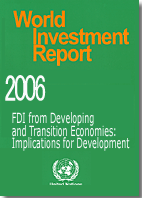World Investment Report 2006 - FDI from Developing and Transition Economies
This year´s World Investment Report focuses on the rise of foreign direct investment (FDI) by transnational corporations (TNCs) from developing and transition economies.
New sources of FDI are emerging among developing and transition economies. This phenomenon has been particularly marked in the past ten years, and a growing number of TNCs from these economies are emerging as major regional - or sometimes even global - players. The new links these TNCs are forging with the rest of the world will have far-reaching repercussions in shaping the global economic landscape of the coming decades.
The Report examines the magnitude of this phenomenon and examines its drivers and determinants, i.e.: what economic factors and policy developments lead firms from developing countries to venture abroad? For low-income countries, FDI from developing countries can be of great importance. In some of them, it accounts for a significant share of all FDI flows. The Report also discusses the development implications of the rise of these new sources of FDI, along with policy responses, for both home and host developing countries.
As in previous years, the Report also presents the latest data on FDI and traces the global and regional trends of FDI and international production by TNCs. Global FDI inflows rose substantially in 2005. A major contributing factor to this strong growth was the marked increase in the inflows to developed countries. Rising global demand for commodities was reflected in the steep increase in natural resource-related FDI, although the services sector continued to be the major recipient of FDI. Among developing regions, Asia remained the main magnet for FDI flows, followed by Latin America, where re-invested earnings have played a major role. Africa´s share in world FDI inflows was still small, but its FDI growth rate has nonetheless surpassed those of other developing regions.
















